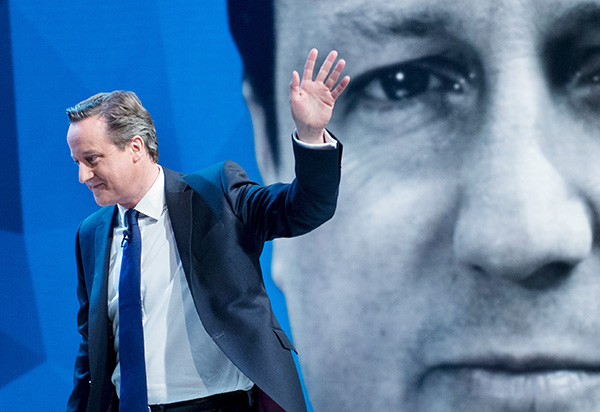 |
|
British Prime Minister David Cameron takes part in a live Q&A during the Sky News/Channel 4 programme: Cameron & Miliband Live: The Battle for Number 10, moderated by Kay Burley (not pictured) at the Sky Studios in Osterley, west London, March 26, 2015. [Photo/Agencies] |
LONDON - Prime Minister David Cameron won the first TV encounter of a close national election in Britain, an opinion poll showed, but opposition Labour leader Ed Miliband leveraged a rare opportunity to promote himself on a national stage.
With Cameron's Conservatives neck-and-neck in the opinion polls with Labour, both are trying to grab an elusive lead over the other before the May 7 ballot to avoid another possible coalition or even a minority government.
Britain's future in the European Union and its territorial integrity could ride on the outcome as Cameron is pledging an EU membership referendum and Miliband may need to do a deal with Scottish nationalists intent on breaking up the United Kingdom.
Cameron and Miliband were interviewed separately but back-to-back in their toughest cross-examinations in years, and subjected to question and answer sessions from a studio audience on Sky News and Channel 4.
A snap Guardian/ICM poll afterwards showed 54 percent of those asked thought Cameron, the leader of the Conservative Party, had won, compared to 46 percent who judged Miliband had triumphed.
Cameron refused to debate Miliband head-to-head, saying he felt the leaders of other minor parties should be included too. His aides are thought to have advised him that there was no upside to such a debate which they feared could help Miliband look like more of a prime-minister-in-waiting.
Cameron, 48, initially appeared uncharacteristically unsettled and conceded he'd made mistakes during his five years in power, but asked voters to give him a second term to finish the job of rebuilding the economy.
"If you're saying we haven't gone fast enough to cut the deficit, I would agree. We need to complete the job," said Cameron, who was unable to give precise borrowing figures for the government.
With most of the British press set against him, Thursday's TV appearance -- which covered everything from immigration to economic policy -- was a rare opportunity for Miliband to talk to voters directly.
He duly used the opportunity to reject persistent criticism from some of his own lawmakers and the country's mostly right-wing press that his image as "a geek" made him an electoral liability, saying he didn't care what people said about him.
"The thing is they see you as a North London geek," Jeremy Paxman, a famously robust interviewer, told Miliband.
"Who cares? Who does?" came the reply. "You know, I don't care what the newspapers write about me."
Miliband, 45, said he had been underestimated before.
"People have thrown a lot at me over four and a half years, but I'm a pretty resilient guy and I've been underestimated at every turn. People said I wouldn't become leader and I did. People said four years ago he can't become prime minister; I think I can."
Stuart Thomson, a public affairs consultant at Bircham Dyson Bell, said both men had got through the encounter without making a serious mistake, but that Cameron, the incumbent, had more to lose than Miliband, the challenger.
"There's no doubt that Miliband exceeded expectations but Cameron held his own," Thomson told Reuters. "The debate has really started the firing gun on the election and all sides know they are in a real battle."